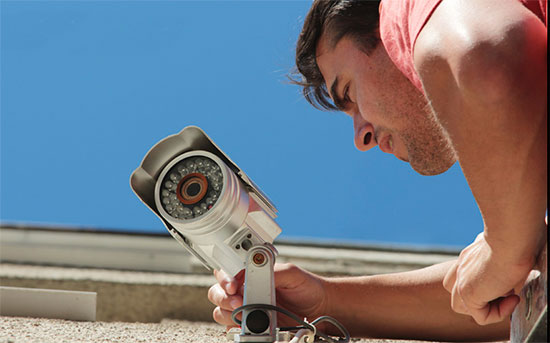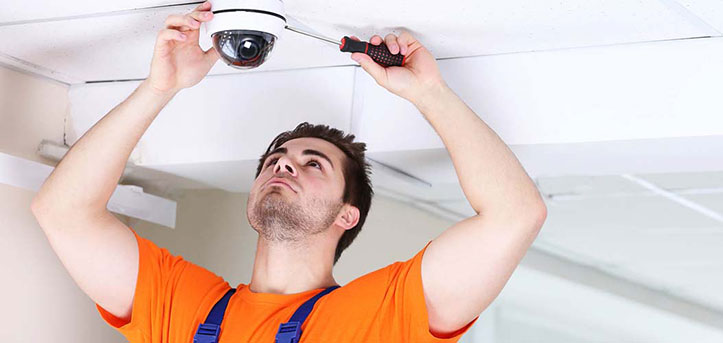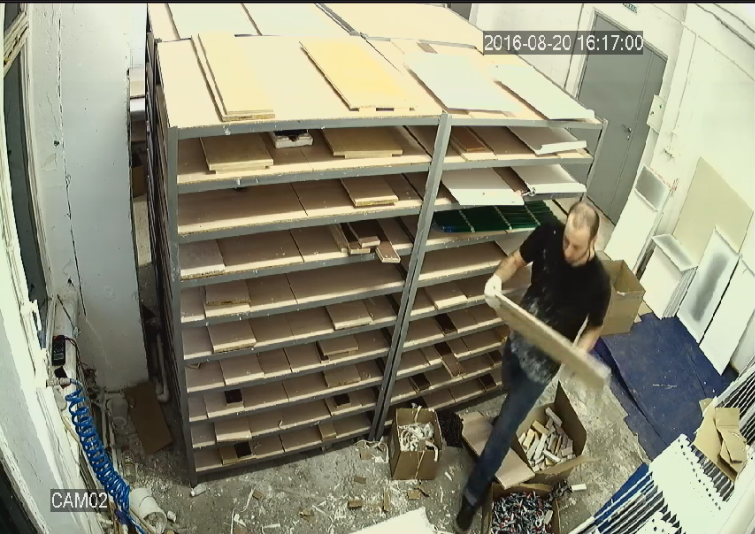CCTV installation in New York

1. An employee visits the facility free of charge, as a result of his inspection and conversation with the customer, the best option for the security system is selected, and a commercial offer is made within 4 hours, the cost of each operation is set.
2. Conclusion of the contract. It includes the preparation of a project and the development of technical specifications, the terms for the installation of video surveillance are specified and a full estimate is calculated.
3. The next stage is the installation of video surveillance. Cables, video cameras, a video recorder and other necessary equipment are brought to the site, including with them they will have all the necessary equipment for work - a ladder, stepladder, monitors for testing, in order to speed up the work process and not be distracted by extraneous details.
4. After assembly, commissioning begins, during which the equipment is "run-in" and the system is launched.
5. After making sure that the system is functioning without failures, Safsale.com employees begin to prepare an act of its delivery. A manual for the operation of a specific model of a video surveillance system is being developed. After signing the act by the customer, the contract for the provision of services is considered fulfilled.
It is worth mentioning that we duly fulfill our warranty obligations to the customer. In the event of malfunctions or interruptions in the performance of the video surveillance system, a representative of the company leaves the facility within 24 hours and promptly solves all the problems that have arisen. After the end of the warranty period, we also provide maintenance.
Today, installing cameras is a matter of just a few hours, because real professionals do this work, but your children, elderly parents, and you yourself are reliably protected from many unpleasant situations that can be avoided with a surveillance system.
By ordering installation from us, you will get the whole range of video camera installation services, and since we deal directly with manufacturers, the prices for equipment are lower than retail prices. We provide our clients with the following range of services:
Design
Mounting and installation
Connecting equipment
Hardware setup
Further maintenance and repair

Popular types of objects for the surveillance system:
First of all, installing video surveillance in an apartment, especially if strangers are often present in the house or if it is necessary to control a nanny looking after your child,
Installation of video surveillance in the entrance will protect against uninvited "guests", the camera can be installed both at the entrance to the entrance, and inside, for example, at the door to the apartment,
The installation of video monitoring in offices and warehouses is also in demand.
A service such as installation of cameras in a store is especially popular, since this type of commercial property is regularly subject to theft, fraud and attacks.
At all times, unfortunately, in our world there have always been encroachments on other people's property and even life. Theft, burglary, arson, vandalism are common. Crimes associated with causing harm to human health are also not uncommon. To protect yourself and your property, the best solution these days is CCTV cameras:
Your children are well protected.
Elderly parents are under constant supervision.
Your house or cottage will be guaranteed to be protected from penetration attempts, break-ins and robberies.
Suspicious persons will not enter your entrance.
Order will reign in the office, the efficiency of the work of employees will increase, and outsiders will not be able to roam the working premises uncontrollably.
In warehouses, in production, thefts, losses and shortages will stop.
Installation of video surveillance in the workplace: legal?

Rather high rates of development of the labor market make managers seek to use different methods of personnel control. One of the measures of such control is the installation of video surveillance. Video filming prevents the theft of inventory items and monitors the performance of the employee's duties. But is such a control measure legal?
Often, employers do not consider it necessary to warn about installed cameras, and the staff turns a blind eye to this. But, according to the constitution, any US citizen has the right to privacy, that is, no one has the right to use such information without the consent of the person.
In the US legislation, little is directly said about the legality of installing video monitoring in the workplace. Some clarity can only be brought in by comments on this subject, which refers to the Labor Code. This article says that any change in labor relations (and the installation of video monitoring is a significant technical change) can only be introduced with the written consent of the employee. The employee must be notified about the installation of video surveillance two months before the start of its direct operation.
Two methods are provided for notification: directly at the workplace (against signature) or by registered mail. If the employee agrees to install video surveillance, it becomes necessary to draw up an additional agreement to the employment contract that is currently in effect. Disagreement! cannot become a reason for refusing to install video cameras and is a reason to terminate the employment contract by dismissing the employee.
The employer is obliged to obtain the employee's consent to the introduction of video monitoring and the processing of personal data in writing and, as indicated in the Federal Law "On Personal Data", place information in the premises in the form of signs that video surveillance is underway.
Installation of covert video surveillance is illegal! If detected, it will be possible to bring the employer to administrative and criminal liability. If the employer installed a hidden camera in order to catch the thief, the video from such a device will not be evidence in court, since it was obtained illegally.
Only a limited circle of people has access to video files. This is the head of the organization, as well as security officers, who, in turn, are responsible for the disclosure and other use of the employee's personal data. Video recordings from cameras are unacceptable to be used as a carrot and a stick in relation to the staff. Third parties should not have access to these files.
An important detail should be noted: when installing CCTV cameras, the employer does not have the right to hold the employee liable for improper performance (or non-performance) of job duties, provided that the contractor has fulfilled the plan set by the management. In this case, the employee can spend part of the time on personal needs (smoke break, telephone conversation, etc.).
At the same time, some organizations are required to conduct video filming in accordance with the regulations. In accordance with the Federal Health Fundamentals Act, educational and medical institutions are required to conduct video recording for the purpose of fire safety and countering the threat of terrorism. Also, video surveillance can be installed in the operational unit of state bodies, as well as for people of certain professions that require increased concentration of attention, such as, for example, an air traffic controller or a security officer.
The staff room, toilet, corridor, rest room are places where CCTV cameras are not allowed. Without special need, cameras are not mounted in the office. Their installation in such places is a violation of both constitutional human rights and moral and ethical standards.
Thus, the “open” installation of video surveillance directly at the workplace (where the employee performs direct labor duties) is a legal means of control, provided that the employee was notified in advance about its installation, agrees to the processing of personal data, and only the security service can view the information received and management of the organization without disclosing it to third parties. There are also exceptions for certain professions and structures.
5 Common Mistakes Clients Make When Installing Video Surveillance

1. Installation in the wrong place. You have found the optimal location for the camera, with a good viewing angle, but after editing, it turns out that in spring and summer, trees obstruct visibility, or sunlight, which gives a blind spot and makes video surveillance useless. The best places to mount the camera are right under the roof in the corner. This will protect it from bad weather and direct sunlight.
2. The camera sees what the eye sees. Do not try to set it as high as possible. For some reason, it is generally accepted that the higher, the greater the coverage and the more we can see, but we must remember that the farther it is from the object, the less clarity. Therefore, try to find a balance, not too high and not too low, so that it is impossible to reach it with your hand or knock it down with a stick, about 2.5-3 meters above the ground.
3. Underestimation of the wireless wi-fi system. For example, it is not possible or you do not want to lay a cable in an already renovated apartment. The best solution would be wireless video surveillance. Wireless cameras are much easier to set up, but understanding the range (distance to the recorder) is an important factor, the video signal may not reach.
4. Lack of a motion sensor with video surveillance. Even the simplest recording device can already be integrated with a motion or door opening sensor today.
This is a very useful feature if you do not have an additional burglar alarm.
5. Lack of Internet connection, having mounted video surveillance, but not connecting the recorder or camera to the router, you lose the ability to view video remotely from your phone or tablet, using only 30% of the system resource.
Installation of video surveillance in rented accommodation
.jpg)
.jpg)
Video surveillance has confidently entered our lives. We are accustomed to video cameras in shops, educational institutions and entrances. But do you need a control system in the apartment you rent?
Our experience shows that installation of video surveillance is desirable if:
The owner enters the apartment without prior notice in your absence (for repairs or just to check);
former tenants may have access to your property (if the lock has not been changed);
dysfunctional neighbors (often drink alcohol, do not comply with elementary sanitary standards of residence, invite suspicious personalities to visit);
or you just have a feeling that someone was in your apartment and touched things;
an area where thefts and burglaries often occur;
the house is not guarded below and an outsider can freely enter it;
There have already been several burglary attempts while you were away.
This list goes on and on. If you answered yes to one of the points, then without a doubt, you should seriously think about it. We recommend in this case to consider a Poe-powered wireless surveillance system, for less wiring and preferably without drilling walls, etc.
Of course, it is important to notify the landlord well in advance to avoid unnecessary disputes, and to draw up some kind of legal document to protect your rights in case of possible quarrels in the future. If you take the liberty of installing CCTV without your landlord's consent, then know that you will be liable for damage to the property, which may result in a lien.
You have received a green light to install cameras in your apartment, but this does not mean that you can just as easily install them outside, for example, on the stairs or in the hallway in front of the entrance, since this is a common area. If you do not want problems with your neighbors in the future, it is better to get permission from the regulating apartment association (or HOA).
In any case, you have the right to feel safe and take the measures necessary to protect your family and property. But no matter what security measures you have in place in your home, it's important to talk to the property owner or apartment association to clear up any misunderstandings later on.
 +1 917 431 2634
+1 917 431 2634
 USA 1540 York Ave . New York. 10028
USA 1540 York Ave . New York. 10028
 Mn-Fr - 10:00 - 18:00
Mn-Fr - 10:00 - 18:00
St, Su : day off

